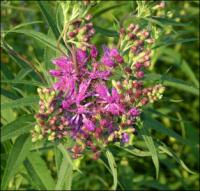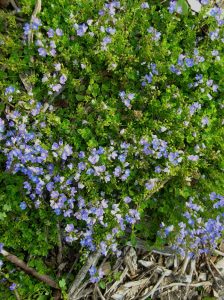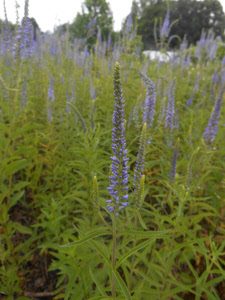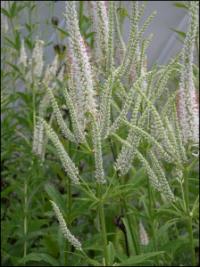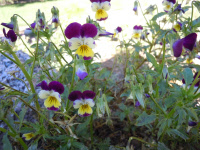Plants for Butterflies and Other Pollinators
Showing 201–208 of 211 results
-
Vernonia noveboracensis Ironweed Z 4-8
Heads of numerous deep, royal purple, platter-forming flower several feet high above in late summer
Heads of numerous deep, royal purple, platter-forming flower several feet high above in late summer
Size: 6-7' x 3'
Care: Sun in moist to moist well-drained soil
Native: Massachusetts to Florida
Wildlife Value: attracts butterfliesNamed for English botanist William Vernon. Infusions of the plant used by Cherokee to relieve pain after childbirth, for loose teeth and for stomach ulcers.
-
Veronica gentianoides Gentian speedwell Z. 4-9
Erect spikes of pale blue flowers sprouting above clumps of basal foliage in late spring/early summer.
Erect spikes of pale blue flowers sprouting above clumps of basal foliage in late spring/early summer.
Can not ship to: Illinois
Size: 18" x 12"
Care: sun to part shade in moist well-drained soil
Native: eastern Europe
Wildlife Value: attracts butterflies
Awards: England's Royal Horticultural Society Award of Merit.According to Christian tradition, as Jesus carried the cross to Calvary, a woman wiped his face with her handkerchief, leaving the imprint of the features of his face, the vera iconica, meaning “true likeness.” When the Catholic Church canonized the woman, the Church gave her the name Saint Veronica. Medieval gardeners named the plant after her due to the perceived likeness of the flower to her handkerchief. Introduced to European gardens by 1784.
-
Veronica liwanensis Turkish speedwell Z 4-8
Tiny true blue saucers smother the ground
OUT OF STOCK
Tiny true blue saucers smother the ground in May & June – groundcover, front of border or rock garden plant.
Size: 1” x 18” spreader over time
Care: sun to part shade in moist well-drained to well-drained soil
Native: NE Anatolia, Caucasus
Wildlife Value: attracts butterflies
Awards: 1997 Plant Select Winner.Collected before 1849.
-
Veronica officinalis Common speedwell Z 3-7
Mat-forming perennial with spikes of blue flowers with darker blue stripes on the petals, May-August
OUT OF STOCK
Mat-forming perennial with spikes of blue flowers with darker blue stripes on the petals, May-August
Size: 4-12” x 6”
Care: sun in dry, well-drained soil
Native: Europe and Asia
Wildlife Value: attracts beesUsed in European traditional medicine as a cough remedy and tonic as well as a salve. Used for centuries as a cure-all medicinal as long ago as ancient Rome. Grown at America’s 1st botanic garden, Elgin Botanic Garden 1811.
-
Veronica spicata Speedwell Z 4-8
Erect crowd of bluish-purple star-shaped flowers cover terminal spikes all summer growing high above basil foliage. If deadheaded blooms all summer.
Erect crowd of bluish-purple star-shaped flowers cover terminal spikes all summer growing high above basil foliage. If deadheaded blooms all summer.
Size: 24" x 18-24"
Care: Sun in well-drained soil
Native: Hilly pastures in Europe and North Asia
Wildlife Value: attracts butterfliesAccording to Christian tradition, as Jesus carried the cross to Calvary a woman wiped his face with her handkerchief, leaving the imprint of Christ’s features, the vera iconica, meaning “the true likeness.” When the Catholic Church canonized the woman, the Church gave her the name Saint Veronica. Medieval gardeners named this plant after her due to a perceived likeness of the flower to her handkerchief. Veronicas have been in cultivation since at least Medieval times. Europeans made tea from V. spicata. This was planted in a symmetrical garden at Versailles.
-
Veronicastrum virginianum, Culver’s root Z 4-9
Tall, graceful ivory spires made of multitudes of small tubes crowd along the stem, arranged like a candelabra. This flowers from early to mid-summer.
Tall, graceful ivory spires made of multitudes of small tubes crowd along the stem, arranged like a candelabra. This flowers from early to mid-summer.
Size: 4' x 18"
Care: full sun to part shade in moist soil
Native: From Canada to Texas, Wisconsin native
Wildlife Value: Numerous bee species, including the Rusty patched Bumble Bee, wasps, and butterflies collect pollen and drink the nectar.Used by American Indians as a laxative and to induce vomiting and clean blood. Cherokee cured typhus and inactive livers with Culver’s root. Seneca Indians used the root in their ceremonies. Sioux also used this to stimulate the liver. They also burned the root for the smoke to purify those who had contact with a dead family member. 1st collected by Rev. John Banister (1649-1692) who moved to colonial Virginia in 1678. A gunman mistakenly shot and killed him while he collected plants. Colonial Puritan Cotton Mather unsuccessfully attempted to use this plant to cure his daughter’s tuberculosis in 1716. Colonial nurseryman John Bartram (1699-177) recorded medicinal uses saying, “One Handful of the Roots of this Plant, boiled in a Pint of Milk, and drank, is used by the back Inhabitants for a powerful Vomit.” Pressed specimen in Emily Dickinson’s herbarium.
-
Viola tricolor Johnny jump up, Heartease Z 2-9 RESEEDING short-lived perennial
Cheerful purple, yellow, and white blooms from spring to late fall in cool weather.
Cheerful purple, yellow, and white blooms from spring to late fall in cool weather.
Size: 3-5” x 4-6”
Care: Sun to part shade in moist well-drained soil
Native: Europe and Asia
Wildlife Value: Violas are the sole food source for the caterpillar of Fritillary butterflies.Viola was named after a mythical young woman who Zeus loved and who Zeus’ wife harassed. Athens adopted the V. tricolor as its symbol. Pliny (24-79) prescribed it for headaches in ancient Rome. Mentioned repeatedly by Shakespeare. In the 1500’s the plant was used to make a medicinal tea to cure chest and lung inflammations, and later to cure impetigo and ulcers. Grown in the Eichstätt Garden, the garden of Johann Konrad von Gemmingen, prince bishop of Eichstätt in Bavaria, c. 1600.
This is the origin of all pansies which resulted from 30 years experiment by English gardener to Lord James Gambier (governor of Newfoundland), William Thompson in early 1800’s. The 1st pansies came from a cross of V. tricolor with V. lutea and V. altaica. When Napoleon Bonaparte died Viola tricolor found in his locket with a snip of Josephine’s hair. Thomas Jefferson imported Viola tricolor from France in 1767. Grown at Elgin Botanic Garden, America’s 1st botanic garden, 1811. Pressed specimen in Emily Dickinson’s herbarium.
-
Wisteria frutescens syn. Wisteria macrostachya America wisteria Z. 5-8
Lush, dense, drooping, fragrant purplish-blue, pea-like racemes in late summer on new fragrant purplish-blue, pea-like. drooping flower-clusters in early summer on new stems.
Lush, dense, drooping, fragrant purplish-blue, pea-like racemes in late summer on new fragrant purplish-blue, pea-like. drooping flower-clusters in early summer on new stems.
Size: 12-20’ x 4’
Care: sun to part shade in moist, mildly acidic soil For best flowering trim vine to four buds from last year's new growth in late winter or early spring, before this year's growth begins. A legume, so it enriches the soil by adding nitrogen. Seed pods poisonous.
Native: Virginia to FL, west to TX, north to IL
Wildlife Value: Larval host for Marine Blue skipper butterfly. Deer resistantCollected before 1753. Wisteria named “in memory of Caspar Wistar,(1761-1818) M.D. late professor of anatomy in the University of Pennsylvania, and for many years president of the American Philosophical Society: a philanthropist of simple manners, and modest pretensions, but an active promoter of science.” Thomas Nuttall.

